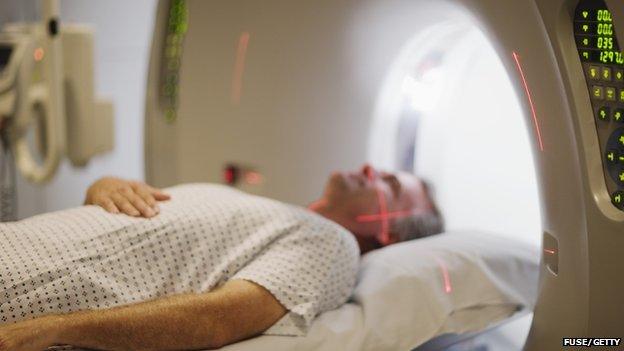MRI scans can deliver cancer therapy
- Published

A hospital scan normally used to detect cancer could be used to steer tumour killing treatments to hard-to-reach targets in the body, say scientists.
The UK team at Sheffield University deployed the magnetic power of MRI scans to control the movement of a specially designed injectable cancer therapy.
Early trials in mice suggest the novel delivery method works.
But years more of studies are needed before it could be used in patients.
The hope is it will revolutionise the way doctors treat cancers that are tricky or impossible to remove surgically - tumours in the brain and spine and cancers that have spread around the body, for example.
Seek and destroy
A benefit of the new MRI method is it appears to home in on cancerous cells with little collateral damage to the surrounding healthy tissue, which should mean fewer side effects for patients.
The scientists tested the method in mice with prostate cancer that had also spread to the lung.
They used a special cancer medicine - human white blood cells modified to carry a cancer-killing virus - to treat the mice.
Before injecting the treatment, they "magnetised" it by loading it with microscopic iron particles.
Once injected into the mice, the researchers were able to use the strong magnets in the MRI scanner to tightly control where the drug travelled.
Dr Munitta Muthana and colleagues say the technique is promising not least because it combines treatment and equipment that is readily available.
Dr Muthana told the BBC: "We need to do more studies first, but hopefully we will be able to start testing it in patients.
"We'd need to check that clinical scanners are strong enough...and if we can reduce the length of time that a patient would need to be in the scanner. The treatment took 30 minutes to a hour in mice.
"An advantage of using MRI is that you can also track where the treatment is going. It could be really useful," she said.
Dr Nick Peel, senior science information officer at Cancer Research UK, said: "Using viruses to kill tumour cells is one of many ways researchers are using the immune system to attack cancer. But getting the virus precisely on target is a real challenge.
"This early research in mice suggests that using a magnetic field from the MRI scanner could help propel the virus towards cancer tumours using metal nanoparticles.
"It's a fascinating idea - but more studies are needed to see if this approach could work in people, especially for tumours located deeper within the body. And we need even more research to show whether this could actually improve treatment."